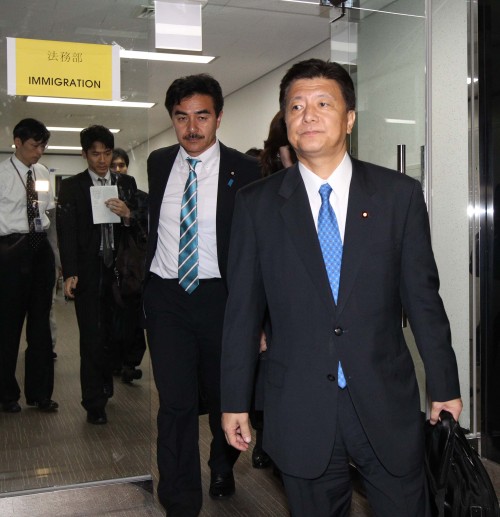Criticism mounts over Tokyo’s territorial claim to Dokdo
Three Japanese lawmakers were asked to return to their country as soon as they arrived at a South Korean airport on Monday, as Seoul deterred them from visiting an eastern island in protest against Tokyo’s repeated territorial claims.
Three Japanese lawmakers were asked to return to their country as soon as they arrived at a South Korean airport on Monday, as Seoul deterred them from visiting an eastern island in protest against Tokyo’s repeated territorial claims.

Defying South Korea’s warning made days earlier, the three right wing politicians arrived at Gimpo International Airport, only to be held back at the immigration check point and asked to return via the next plane to Tokyo.
Yoshitaka Shindo, Tomomi Inada and Masahisa Sato, all belonging Japan’s opposition Liberal Democratic Party, appear to have pushed ahead with the plan to visit the South Korean island of Ulleungdo with a belief that video footage of them being barred from entry will help them win support from right wingers back at home, analysts here say.
Tokyo has for years laid territorial claims over the South Korean volcanic islets of Dokdo ― located about 90 kilometers east of Ulleungdo.
Dokdo, called Takeshima by the Japanese, is a group of small islets that lie in rich fishing grounds in the East Sea between South Korea and Japan, which also are believed to contain large gas deposits.
The latest dispute erupted when the Japanese politicians said they would visit Ulleungdo to see for themselves “how South Koreans feel” about the issue that has been straining ties between the two neighboring countries for six decades.
Arriving at the Seoul airport on Monday, Shindo said although Dokdo was Japanese territory, “discussions are necessary as disputes remain.”
He also warned South Korea’s entry ban could cause diplomatic problems.
“We will come back (to Korea),” he said. “We are two close countries. We need to talk through this issue.”
As the politicians were refusing to leave the country and staying at the airport waiting room for hours, the deputy chief of the Japanese mission in Seoul called the Foreign Ministry to express regret about the entry ban, a high-ranking official here said on the condition of customary anonymity.
South Korea sees the high-profile trip to the island as an attempt by Japan to renew its longstanding territorial claims on Dokdo and believes it does not need to overreact. Seoul has for years kept a policy of not reacting strongly to Tokyo’s claims, believing it has no reason to draw international attention to an island that clearly belongs to the country.
A rightist Japanese professor, who had attempted to visit Ulleungdo quietly by himself, was also barred from entering Korea on Sunday, according to the Justice Ministry in Seoul.
Shimojo Masao, a Takushoku University professor who reportedly arranged the Tokyo politicians’ trip to the South Korean island, arrived at the Incheon International Airport via an Asiana Airlines flight late Sunday. Immediately denied entry, he returned via the next flight, the ministry said.
Anti-Japanese sentiment ran high as civic groups denounced the Japanese politicians’ move.
The Voluntary Agency Network of Korea, a non-governmental group seeking to set right Japan’s history distortion, asked the government “not to be fooled by Japan’s political drama to make Dokdo seem like a disputed island” and “stay calm.”
About 50 students of Dokdo Academy staged a performance as Japanese lawmakers arrived at the airport earlier Monday, a move their teachers described as “voluntary and peaceful.” The Dokdo Academy was established in 2007 to teach university students about Korea’s territorial sovereignty over Dokdo.
Some members of conservative groups here protested more strongly, spraying chili powder over the Japanese national flag.
Meanwhile, the Tokyo government is set to publish a new defense white paper that reiterates Japan’s territorial claim to Dokdo as early as Tuesday, a move the Seoul government fears will worsen the anti-Japan sentiment here.
“We have various plans set up to deal with this calmly, but firmly,” a high-ranking Foreign Ministry official told reporters, asking not to be named. “But we will try not to make this issue strain bilateral ties with Japan excessively.”
After publishing the first book in 1970, Tokyo has been releasing new defense white papers annually since 1976. In the book, Japan claims “there are unsolved issues” regarding Dokdo “which is Japan’s territory.”
Criticizing the Japanese politicians’ move, political parties here noted the need of refraining from overreacting so as not to draw too much international attention and make it seem as though there are disputes over the Dokdo sovereignty.
Lee Jae-oh, a lawmaker of Seoul’s ruling party and also President Lee Myung-bak’s special affairs minister, landed on Dokdo on Monday, vowing to stay in the easternmost islets until the Tokyo politicians return to their country.
The latest diplomatic tensions over Dokdo started early last month when Japan imposed a one-month ban on the use of Korean Air flights by its diplomats in retaliation for the airline’s June 16 test flight of its first Airbus A380 above Dokdo.
Tokyo’s ruling Democratic Party may believe that the boycott of Korean Air and the publication of a new defense white paper would help it project an image it is committed to protecting territorial sovereignty, further straining ties with Seoul, analysts say.
Dismissing Tokyo’s repeated claims as nonsense because South Korea reclaimed sovereignty over the mainland as well as several islands around the peninsula after independence, Seoul has stationed Coast Guard officers on Dokdo since 1954. Two citizens live on the islets.
By Shin Hae-in (hayney@heraldcorp.com)








![[Graphic News] More Koreans say they plan long-distance trips this year](http://res.heraldm.com/phpwas/restmb_idxmake.php?idx=644&simg=/content/image/2024/04/17/20240417050828_0.gif&u=)
![[KH Explains] Hyundai's full hybrid edge to pay off amid slow transition to pure EVs](http://res.heraldm.com/phpwas/restmb_idxmake.php?idx=644&simg=/content/image/2024/04/18/20240418050645_0.jpg&u=20240419100350)







![[KH Explains] Hyundai's full hybrid edge to pay off amid slow transition to pure EVs](http://res.heraldm.com/phpwas/restmb_idxmake.php?idx=652&simg=/content/image/2024/04/18/20240418050645_0.jpg&u=20240419100350)

![[Today’s K-pop] Illit drops debut single remix](http://res.heraldm.com/phpwas/restmb_idxmake.php?idx=642&simg=/content/image/2024/04/19/20240419050612_0.jpg&u=)